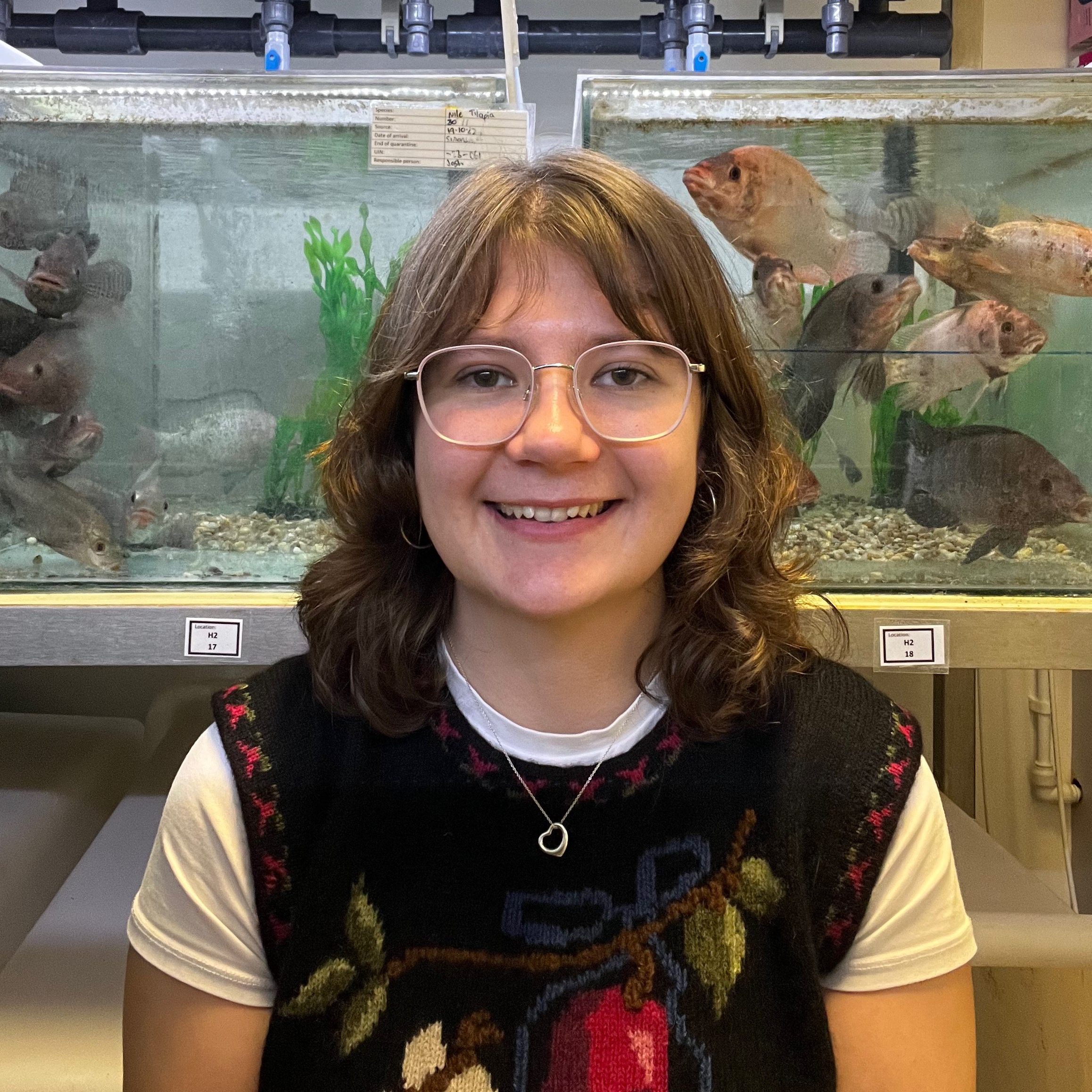Cohort 2.4 is the fourth group of students in BioMed2. They will start with us in October 2025 and you can read about their exciting research projects below.

Brodie Chapman-Rigney
Greening Minds and Bodies: Assessing the physical, psychological and environmental impacts of a plant-based diet intervention
Coming soon

Carys Moore
Enhancing Immunological Control of SARS-CoV-2
Coming soon

Ellie Turk
Quantifying the impact of chronic pesticide exposure on disease susceptibility
I graduated from the University of Durham in 2023 with an undergraduate degree in Biological Sciences. There, and during a placement in the lab of Prof. Joanna Wilson at McMaster University, I became interested in the effects of chemical pollutants on animal development, behaviour and physiology. My Master’s at the University of Bristol in the lab of Prof. Christos Ioannou sought to investigate whether environmental caffeine pollution alters fish collective behaviour. I am excited to expand my research interests into the realm of infection during this PhD, investigating the effects of pesticide treatments on bumblebee immunity under the supervision of Dr Harry Siviter at the University of Bristol.

Holly Ellard
Integrative analysis of whole genomes and transcriptomes from multiple cell types in rare disease patients
Following my undergraduate study of Biology at the University of Bath, I completed an MSc in Genetic and Genomic Counselling at Cardiff University. Inspired by the potential of genomic medicine, I pursued opportunities to evaluate the introduction of whole genome sequencing (WGS) to diagnose rare disease in the NHS through my MSc dissertation and subsequent work as a research assistant. I am eager to conduct research to improve the diagnostic yield of genomic technologies and reduce the prolonged and difficult journey to a genetic diagnosis experienced by many patients with rare disease and their families. My PhD at the University of Exeter will be focused on integrating RNA-seq and proteomic data with WGS data to identify new genetic causes of rare bleeding, thrombotic and platelet disorders.

Jessica Turner
Investigating the role of the microbiome in obesity-driven colorectal cancer development
I graduated from the University of Bath with an integrated masters degree in Biomedical Sciences, where I developed a strong interest in cancer biology and microbiology. My master’s project focused on antibiotic and oxidative stress responses in multi-drug resistant enterococci. During my degree, I also undertook a one-year industrial placement at Advanced Instruments, gaining experience in cell line development and mammalian cell culture. My PhD is based at the University of Bristol, under the supervision of Dr Kaitlin Wade and Prof Emma Vincent and will investigate the impact of adiposity on the gut microbiome and examine whether these changes play a causal role in the development of colorectal cancer. My project is interdisciplinary and will combine both epidemiological and cell biology approaches.

Kaiza Taylor
Emerging co-resistance to first and second line antibiotics in urinary pathogens and implications for the control of urosepsis
Coming soon

Kirsty Cordwell
Assuming associations from old data – the case of ADHD and drug use
Coming soon

Kyle Perrins
Developing new weapons to fight drug-resistant superbugs – targeting lipoteichoic acid biosynthesis
During my BSc (Hons) in Biochemistry with Professional Placement at the University of Bath, I completed a final-year project within the Laabei lab where I investigated the activity of novel oxadiazole compounds against biofilm formation in Gram-positive bacteria. After graduating in 2022, I worked for the UK Health Security Agency (UKHSA) at Porton Down for two years. Here I was involved in various projects relating to public health, including bio-surveillance and recombinant virology. My PhD project, at the University of Bristol, and once again with Dr Laabei, is a continuation of research conducted in my final-year project. It aims to explore and elucidate the mechanism of action of a novel class of oxadiazole antibiotic compounds against bacterial pathogens such as methicillin-resistant Staphylococcus aureus (MRSA). This is paramount to their potential future exploitation and clinical use, and especially relevant considering rising antimicrobial resistance rates across the world.

Leandros Rapteas
Brain stimulation and neurophysiological investigations of central nervous system changes in pathological pain and their augmentation by treatment
I began my career as a Physiotherapist in Greece before being awarded an Onassis Scholarship to pursue an MSc in Human Anatomy at the University of Edinburgh. After this, I worked in Higher Education in Greece and the UK before completing an MRes in Biomedical Sciences and Translational Medicine at the University of Liverpool, where I worked on a Versus Arthritis–funded project investigating pain mechanisms in fibromyalgia. I continued this research as an Honorary Research Associate which led to publications on pain phenotyping and corneal nerve changes in fibromyalgia. I then worked as an Anatomy Teaching Fellow at the University of Birmingham, where I combined anatomy education with EDI-focused initiatives to make medical curricula more inclusive and representative. I am now pursuing a PhD at Cardiff University under the supervision of Dr Jennifer Davies (primary supervisor), with co-supervisors Dr George Tackley, Professor Tony Pickering and Dr Sam Hughes, investigating central nervous system changes in chronic pain using MRI, brain stimulation, sensory testing and neurophysiological approaches.

Lizzy Sears
Can Fzd receptor transfer impact paracrine Wnt signalling in Gastric cancer
I completed my undergraduate degree in Medical Sciences at the University of Exeter. As part of this I completed a dissertation project investigating the transferability of HDAC inhibitors to type 1 diabetes treatment and prevention which revealed some very exciting insights for further work to be done. I was also fortunate enough to undertake a professional training year as part of my undergraduate studies where I utilized CRISPR/Cas9 gene editing techniques to investigate the importance of STAT3 in pancreatic cancer. I look forward to continue working on science involving signalling pathways and cancer development with my PhD focusing on Wnt signalling and Gastric cancer at the University of Exeter.

Meg Llewellyn
Developing phage therapy solutions for Staphylococcus aureus
I graduated from the University of Liverpool with a BSc Biological Sciences degree in 2024, and then I went on to complete my Masters by Research degree with the University of Exeter, finishing in 2025. During my Masters project I focused on anti-phage defence system expression and phage susceptibility in Pseudomonas aeruginosa. Across both of these degrees I developed a strong interest in phage-bacteria interactions, that motivated me to continue in this field. My PhD project, supervised by Edze Westra at the University of Exeter, will focus on developing phage therapy solutions for Pseudomonas aeruginosa and Staphylococcus aureus, with particular interest in anti-phage defence system action and interactions within biofilms. During my PhD, I aspire to make meaningful contributions to the field of phage therapy, and overall help to combat the global antimicrobial resistance crisis.

Nehali Humane
An investigation of the factors that influence post-disaster mental health in a Brazilian birth cohort study
I developed a keen interest in psychology while pursuing Bachelors of Physiotherapy. With strong inclination in public health research, I did my MSc Population Health at University College London. While doing my Masters, I worked on a systematic review titled as ‘Mental Health Peer Support Services in Adolescents and Young’. Through this, I gained skills in evidence synthesis, epidemiology, and statistical analysis using STATA. Following my graduation, I worked as a Research Associate at the National Institute of Health and Care and later at the University of Lancashire, contributing to multiple projects in mental health.
My PhD will explore the impact of climate-related trauma on youth mental health within the 2004 Pelotas Birth Cohort Study. I aim to identify pre-existing psychological, social, and physiological factors that act as risks or resilience factors.

Niamh Adcock
Understanding neuronal dysfunction in Tuberous Sclerosis
I graduated from the University of Bristol in 2024 with an MSci in Biochemistry, where I developed an interest in the cell biology of neurological function. I explored this in my Master’s project with Professor Jon Hanley, which focused on microRNA regulation in synapses. My PhD project will also be based in Bristol under the supervision of Dr Bernadette Carroll. I will be investigating neuronal dysfunction in a rare genetic disease called Tuberous Sclerosis, where I will use in vivo and in vitro techniques to understand how dysfunction in cellular homeostasis can impact neuronal networks. Through this project, I hope to contribute to our understanding of TS and how it can be treated.

Ollie Smail
Looking for disease-modifying effects in the dark side of the genome
Coming soon

Princess Kisi
Building the evidence around risks and actions on thunderstorm asthma
Having experienced childhood asthma in Zimbabwe that resolved after moving to the UK, I developed an early interest in respiratory health and environmental exposures. I hold a BSc in Biological Sciences from the University of East Anglia and an MSc (Dist) in Toxicology from the University of Birmingham. Motivated by my background, I initiated an MSc research project with Dr Karen Exley, UKHSA Air Quality Team Lead (formerly PHE), investigating PM2.5 toxicity and its link to COVID-19 morbidity. I then spent three years in regulatory toxicology across the pesticide and medical device sectors before joining UKHSA as an Environmental Public Health Scientist, specialising in air pollution toxicology. My PhD is based at the European Centre for Environment and Human Health, part of Exeter Medical School, supervised by Professor Ben Wheeler. It examines the epidemiology of thunderstorm asthma in the UK under climate change, using data analysis and modelling to inform risk reduction.

Regan Mills
Neuroimaging brain reward systems to stratify patients across the psychosis spectrum
“For my MRes in Brain Sciences at UCL, I helped to run an experimental drug trial for PTSD, assessing the effects of spironolactone on intrusive memory formation. I learnt how to perform and analyse EEG, and more broadly gained an appreciation of how neuroimaging can be used to provide a neurobiologically-grounded understanding of psychiatric symptoms.
Post-graduation, I gravitated towards mental health and neuroimaging-based research. As a research assistant at UCL, I investigated the neural mechanisms driving mood instability and risk-taking in bipolar disorder, using fMRI and smartphone-based data collection.
For my PhD, supervised by Dr Tom Lancaster, I will use a combination of clinical, neuroimaging, and genetic data to understand exactly how brain reward circuitry is different in individuals across the psychosis spectrum. I hope to provide novel insight into the aetiology of striatal dysregulation in psychosis, with the goal of developing more refined diagnostic and treatment strategies. “

Rosalyn Acevedo
Exploring the role of hyaluronan in cognition across the lifespan
Coming soon

Sophie Potter
Small-Molecule G-Quadruplex (G4) Ligands as Candidate Antibacterials for Resistant Bacteria
I graduated from the University of Nottingham with a BSc in Microbiology, before completing an MSc in Genomic Medicine at the University of Manchester. During my MSc, I investigated the genome-wide distribution of G-quadruplexes (G4s) and assessed their potential role as primary drivers of hyper-mutability leading to de novo pathogenic variants in rare genetic diseases. For my BSc dissertation, I studied the prevalence and characterisation of Campylobacter species and associated phages isolated from retail chicken liver. These experiences have fostered a strong interest in microbiology and genomics, which I now combine in my PhD research in Prof. Jim Spencer’s lab at the University of Bristol. My project explores the antibacterial potential of small-molecule ligands that target G4s in key antibiotic resistance genes, with the aim of significantly down-regulating or inactivating gene expression to overcome resistance.
